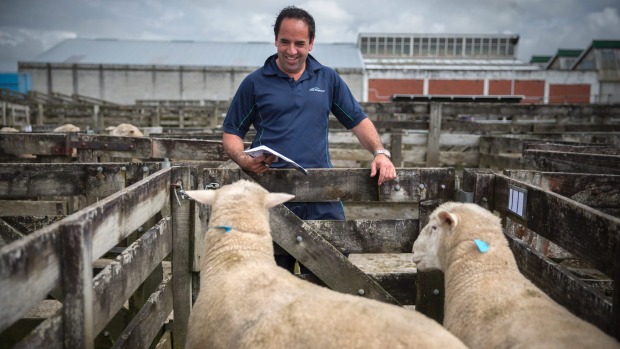
PGG Wrightson Livestock national genetics manager Callum Stewart at the ram sale at Feilding saleyards.
Tis the season to be buying rams for work next year for North Island farmers.
PGG Wrightson Livestock genetic manager, Callum Stewart said farmers would continue to buy two tooth rams at the major sales in the North Island to the end of December, and in the South Island a little later, usually in January and February.
He said central and southern North Island buyers were important at Feilding sales, but buyers came from throughout New Zealand.
“About 50 per cent of rams are sold on farm, and half are sold through national and local sales.”
Stewart observed buyers taking the usual steps during bidding for 127 terminal polled dorset two-tooth rams at the Glengarry 50th ram sale at the Feilding saleyards.
He said farmers checked rams by looking at their figures on paper, but they had to like the animals as well.
Stewart said they bought bulls the same way – looking at figures first and then running their eyes over a cattle beast as well.
“Buyers are looking for ram with a good constitution. That means good body condition and the ram has to be structurally sound and the loin area is important. They need a good straight back. People want early finishing lambs from rams. That means a ram has to be sound. It has to service ewes, and has to have good feet and legs.”
Stewart said some farmers wanted early lambs and would be starting mating soon. Others in hill country put the ram out in March, April or June.
He said many farmers wanted a meat breed, and bought a terminal sire, which meant all lambs, male and female went to the meat plant.
“Meat breeds such as the charollais, southdown, suffolks, hampshire, dorset and south suffolk. They don’t care so much about wool. They are thinking meat.”
Other farmers wanted to keep female sheep for replacements and were more inclined to have romneys, coopworths or perendale ewes.
Stewart said the problem with dropping ewe numbers was that ram numbers remained the same. That allowed farmers to people could pick and chose a greater ram selection.
Many ram buyers were looking for facial eczema tolerant rams after the bad year for the disease, which meant fewer lambs, and production losses from ewes.
The North Island ram fair is at Manfeild Park in Feilding on December 13. Wool and meat breeds will be presented with many farmers taking the opportunity to look at rams, before buying starts.
